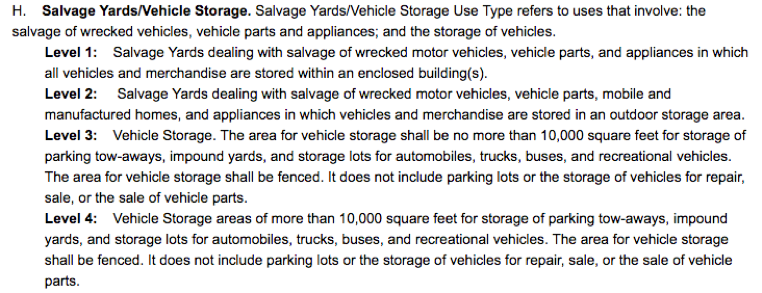The Truth about Conditional Use Permits
Conditional use permits are often touted as a kind of exception to the zoning code for uses that are beneficial to the community. For instance, Tacoma’s conditional use pamphlet, still explains conditional use permits in this way.
However, that is no longer the whole story. Today, conditional use permits are an extra hurdle that regulators have put in place before property owners can use their properties for an especially intense use. Therefore, you no longer need to prove that a particular use will be a benefit to the neighborhood; you merely have to show that the use won’t harm the neighborhood.
How the Zoning Code Implements Conditional Use Permits
The below picture shows a zoning table for the Parkland, Spanaway, Midland area of Pierce County. As the “NOTES” indicate, every “C” in the table denotes a use that is allowed within a particular zone, but only with a conditional use permit.

According to the above table, if you have a property in a Commercial Mixed Use District (CMUD), you are explicitly allowed to use that property for level 2, 3, or 4 “Salvage Yard/Vehicle Storage” as long as you obtain a conditional use permit. Will a vehicle salvage yard “benefit” the neighborhood? Probably not —but according to the code, you can get a conditional use permit for that use anyway.
Thus, in Pierce County and many other jurisdictions, a conditional use permit is less often an outright exception for beneficial uses, and more often an additional hurdle that regulators put in place for high-intensity certain uses—beneficial or otherwise. This extra hurdle allows regulators to use a degree of discretion before approving those certain uses in a given zone.
Why do regulators require a conditional use permit for certain uses and not others within a given zone?
Typically, conditional use permits are required for uses that are on the borderline of being too intense for a given zone.
Going back to the above example, you can see that, while “Salvage Yards/Vehicle Storage” level 1 is explicitly allowed in CMUD zones, levels 2, 3, and 4 are not allowed without a conditional use permit. That’s because levels 2, 3, and 4 are more intense. Check out the definitions below:

By requiring a conditional use permit for the more intense uses within a given zone, regulators can exercise an increased level of discretion to ensure that the more-intense use will not disturb the character of the neighborhood.
In theory, this allows for much more fine-grained zoning that better suits the needs of a neighborhood. However, in the real world, increasing regulatory discretion can sometimes lead to arbitrary decisions.
How to Obtain a Conditional Use Permit
While it is universally true that conditional use permits provide regulators with increased discretion, the specific criteria for obtaining a conditional use permit varies from jurisdiction to jurisdiction.
Pierce County has published a full conditional use permit application checklist. Among other things, a conditional use permit will only be approved if all of the following statements are true:
- The granting of the proposed Conditional Use Permit will not be detrimental to the public health, safety, and general welfare;
- The granting of the proposed Conditional Use Permit will not adversely affect the established character and planned character of the surrounding vicinity;
- The granting of the proposed Conditional Use Permit will not be injurious to the uses, planned uses, property, or improvements adjacent to, and in the vicinity of, the site upon which the proposed use is to be located;
- That the granting of the proposed Conditional Use Permit is consistent and compatible with the intent of the goals, objectives and policies of the County’s Comprehensive Plan, appropriate Community Plan (provided that, in the event of conflict with the Comprehensive Plan, the Comprehensive Plan prevails), and any implementing regulation;
- That all conditions necessary to lessen any impacts of the proposed use are conditions that can be monitored and enforced;
- That the proposed use will not introduce hazardous conditions at the site that cannot be mitigated to protect adjacent properties, the vicinity, and the public health, safety, and welfare of the community from such hazard;
- That the conditional use will be supported by, and not adversely affect, adequate public facilities and services, or that conditions can be imposed to lessen any adverse impacts on such facilities and services; and
- That the Level of Service standards for public facilities and services are met in accordance with concurrency management requirements.
Notice how Pierce County does not require an applicant to prove that the conditional use will be beneficial; it merely requires that the use not be detrimental or injurious. This is a nuanced but important difference because it should theoretically make it easier for a property owner to obtain a conditional use permit.
However, obtaining a conditional use permit is often difficult in practice. Even a slight potentially adverse impact can stop regulators from approving your proposed conditional use. Additionally, the approval process generally requires a public hearing, which provides angry neighbors with an opportunity to voice their concerns about the proposed conditional use to municipal staff.
Alternatives to a Conditional Use Permit
Even if a conditional use permit is not right for your situation, there are several alternatives that may help you put your property to use:
Click the links above to learn more about these topics in and around Pierce County.
How can a Real Estate Attorney Help You Obtain a Conditional Use Permit?
A skilled attorney can help you navigate the application process, effectively negotiate with officials, pacify angry neighbors, and move past unexpected hurdles. You can substantially increase your chances of success by hiring an experienced real estate attorney who can guide you through the process.
At the Brink Law Firm, we are intimately familiar with the conditional use permitting process in Pierce County and Tacoma. We have obtained multiple conditional use permits for clients, and for ourselves on our personal investment properties. To talk about your options, call us at 253.620.6666 or send us an email through our online contact form

